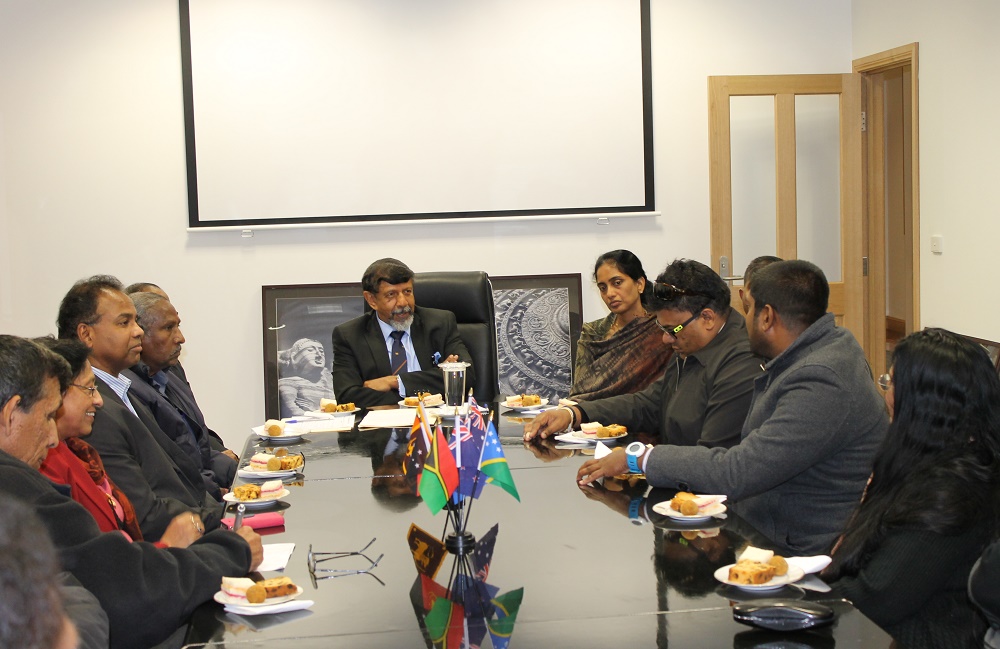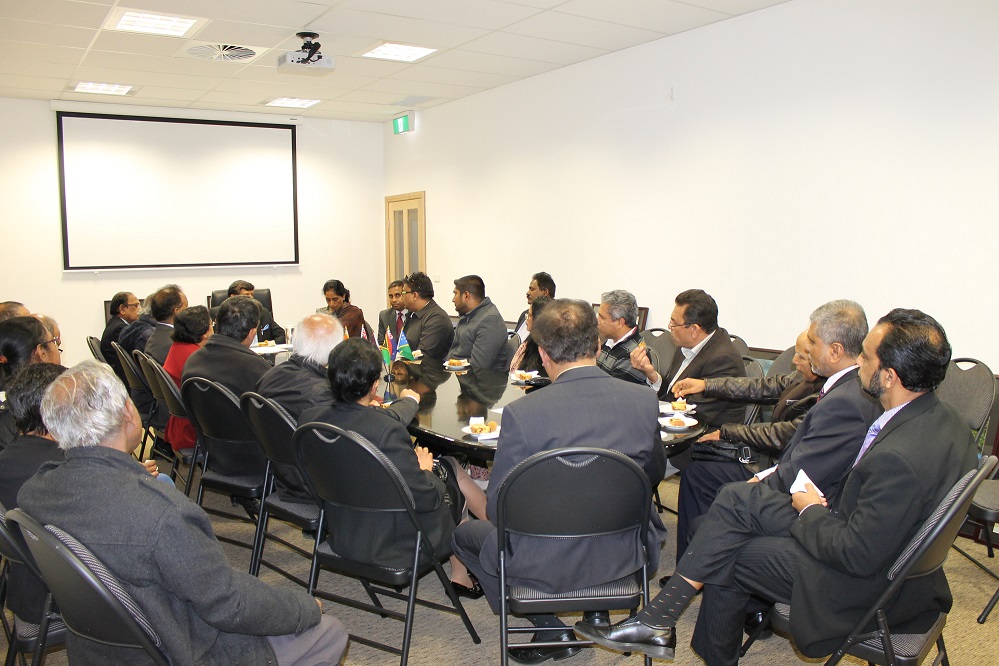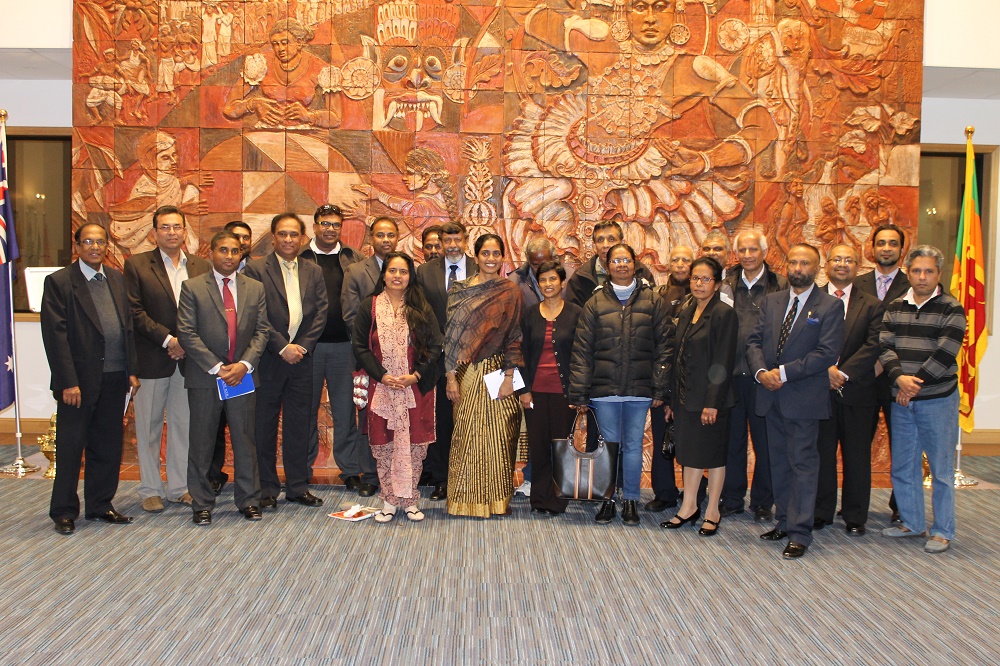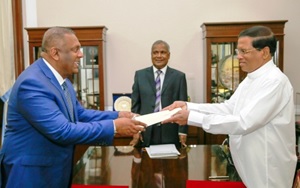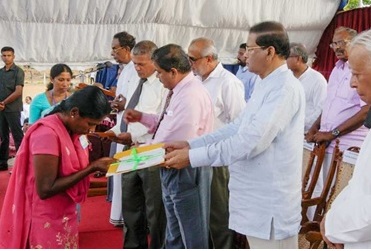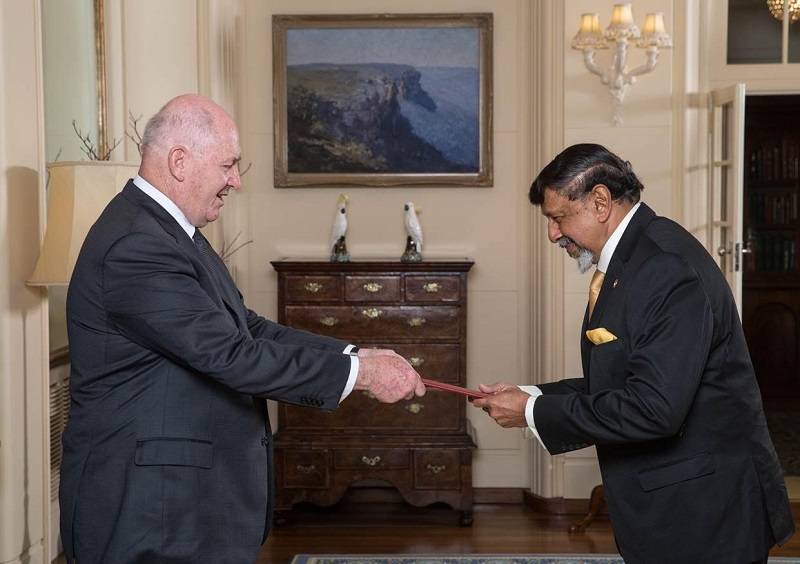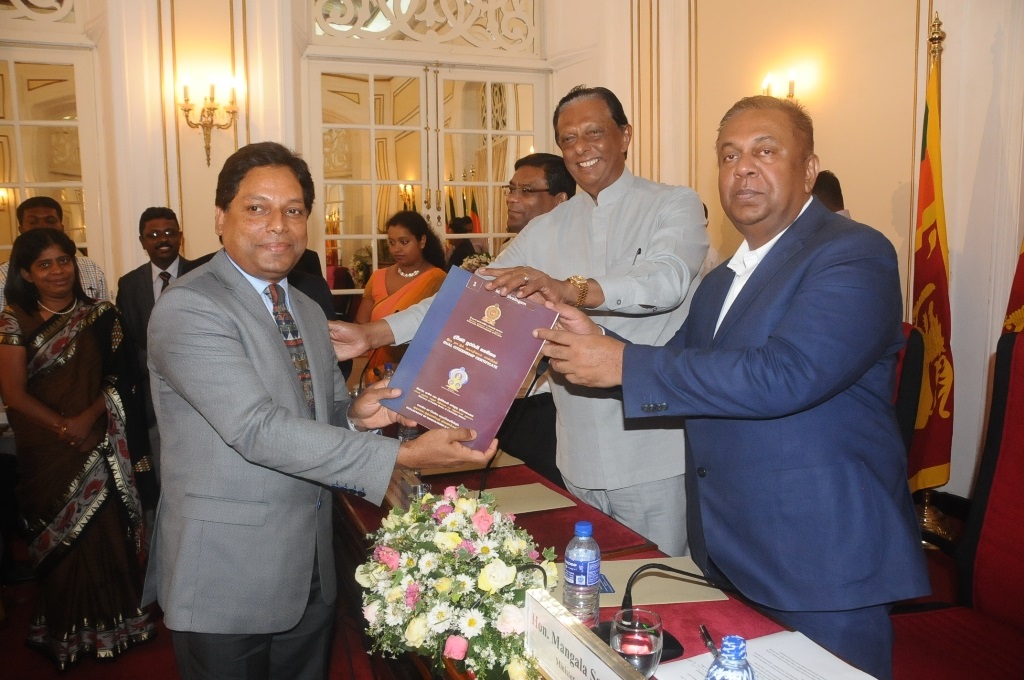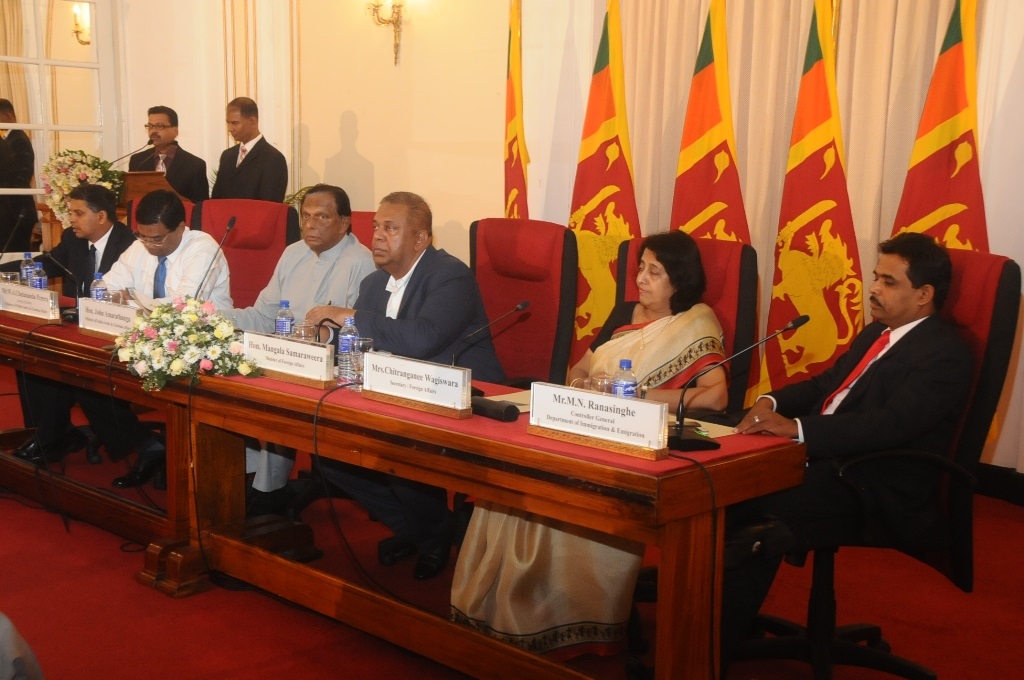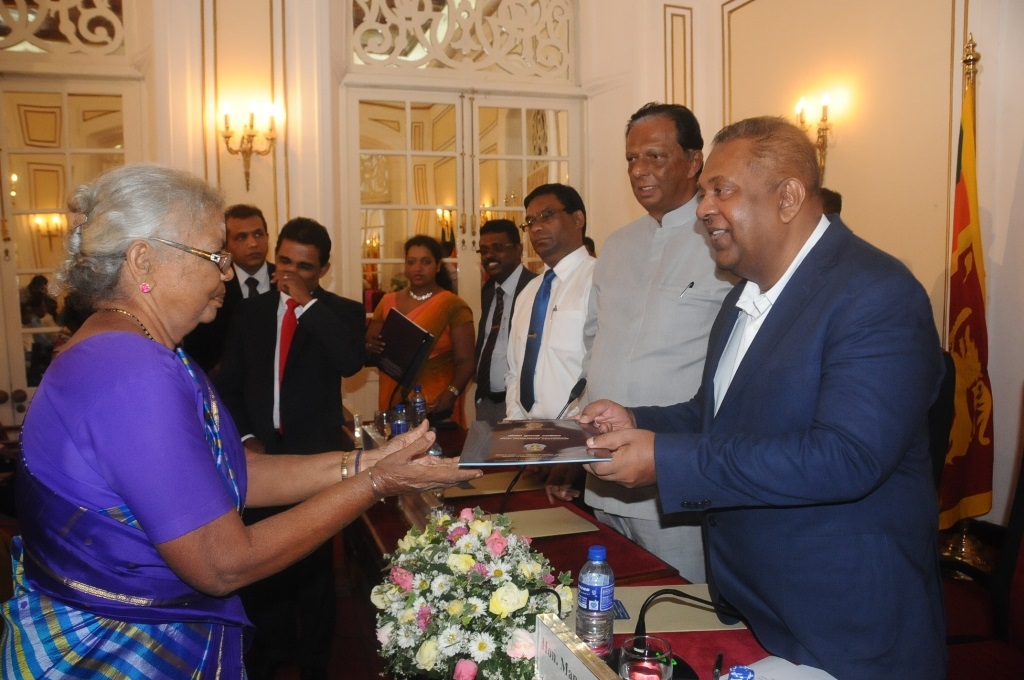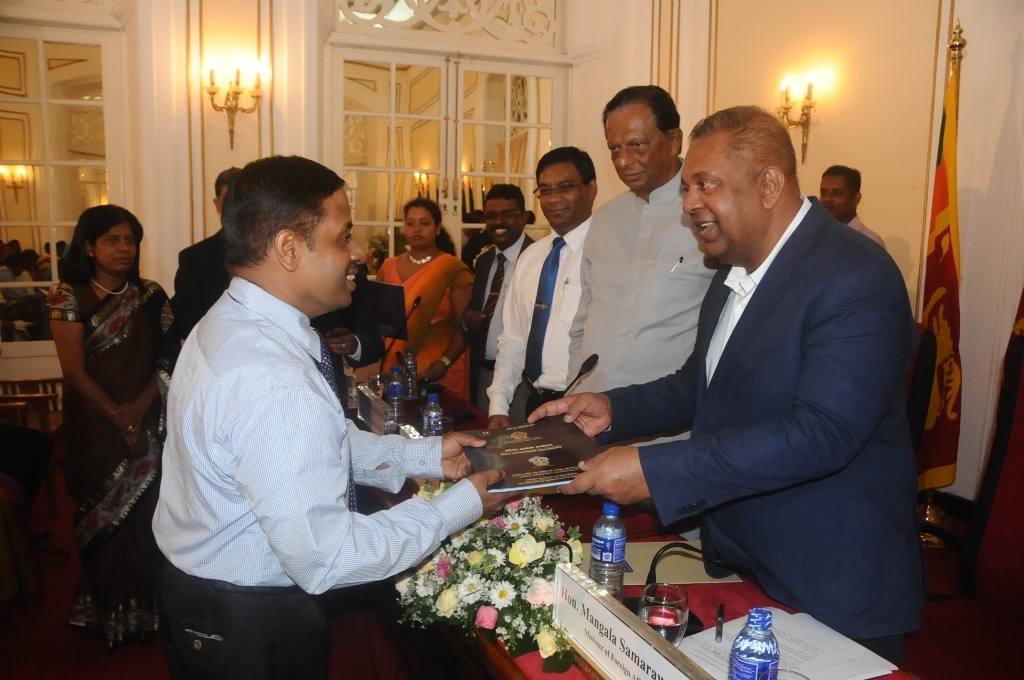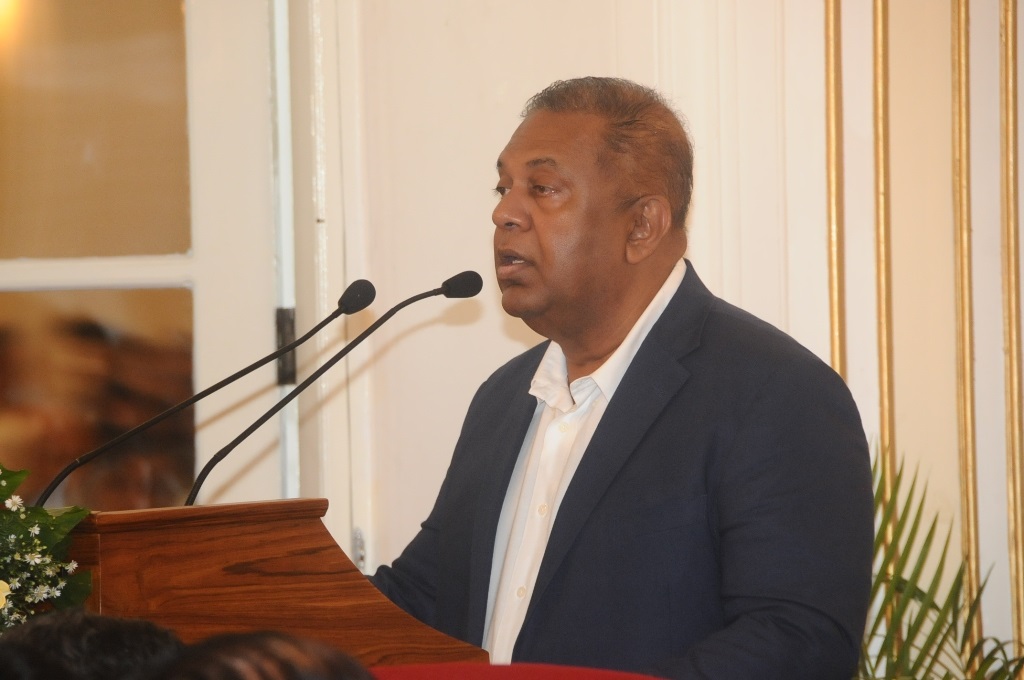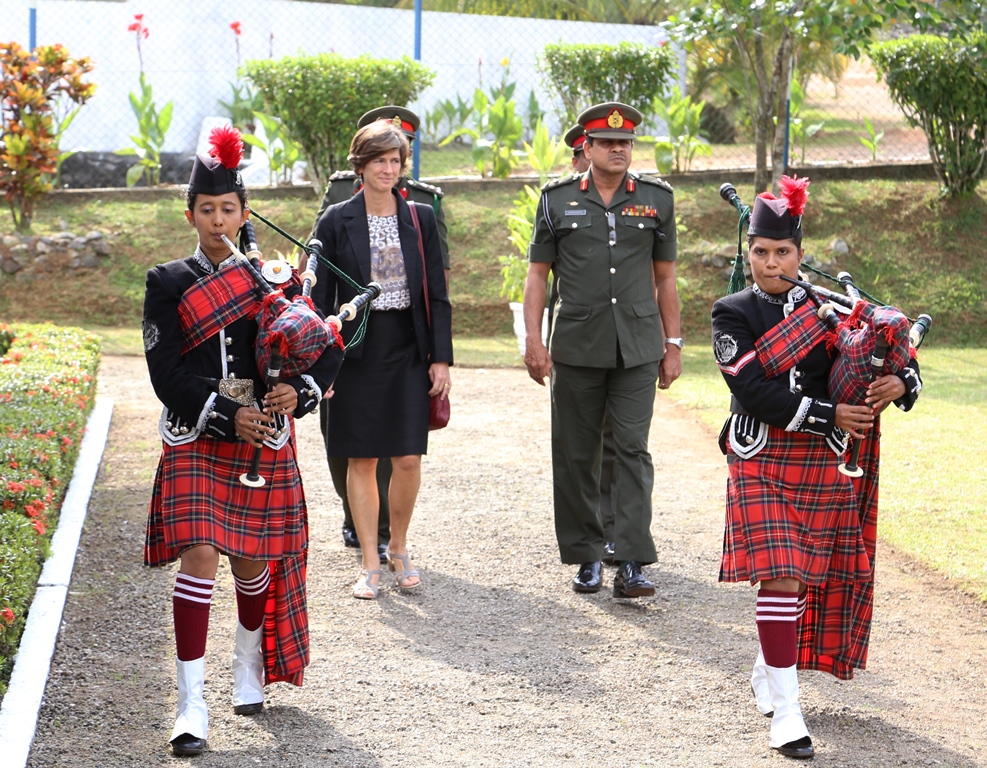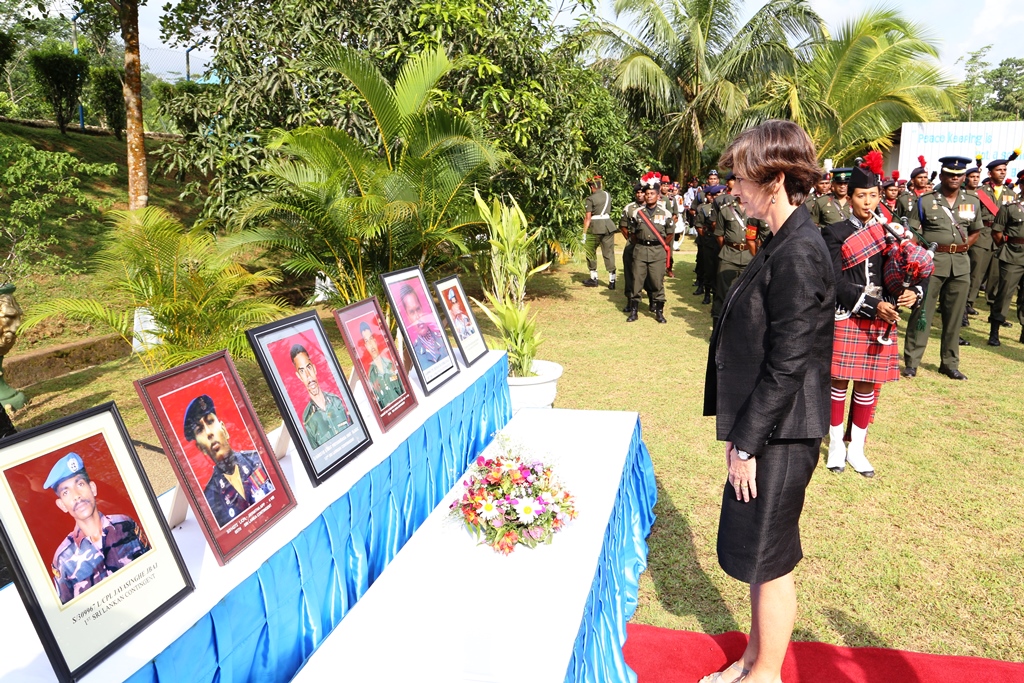


Popular UK newspaper Sunday Times declares Sri Lanka as the destination of the year
September 8, 2015
Sri Lanka got a boost from the popular UK newspaper Sunday Times last week with the country promoted as the holiday destination of the year for Britons.
Two promotional articles in the Sunday Times’ travel section gave pride of place to Sri Lanka.
In an article titled ‘Follow the sun this winter’, the newspaper featured 10 destinations and Sri Lanka was tagged ‘Destination of the Year’ for tea and sea.
Sri Lanka received the accolade amidst a selection of countries and cities such as Barbados, Seychelles, St. Lucia, Goa, Mauritius, Mexico, Brazil and Cape Town.
In another article featuring luxury travel, the Sunday Times journalist Tim Shipman had a story on Sri Lanka as “Our destination of the year”.
He says Sri Lanka “is becoming chic and sophisticated but it hasn’t lost its charm”.
“Marco Polo called Sri Lanka ‘the finest island of its size in all the world’. He wasn’t wrong. You can do most of what matters herein two weeks or stay forever and never do the half of it. After just a couple of days, I looked again at Sri Lanka and saw not a tear but a jewel,” says Shipman, who enjoyed a 12-night stay in Sri Lanka.
Tourist arrivals from UK in the first eight months of this year have risen by 13% to 111,131 whilst in August the increase was 15% to 17,908 over an year earlier.
http://www.ft.lk/article/467705/Kudos-to-SL-holiday-for-Britons
Remarks by Hon. Mangala Samaraweera, Minister of Foreign Affairs to the Diplomatic Corps based in Colombo, 28 August 2015
August 31, 2015
Your Excellencies,
It is my pleasure, this evening, to welcome all of you today to the Republic building, having been sworn in early this week as the Minister of Foreign Affairs. At the moment Sri Lanka has the dubious honour of having the smallest Cabinet in the world, having had the largest in the world last year. At the moment we have a Cabinet of five, but the Government will be in place by Wednesday.
In fact I recall vividly Your Excellencies, the last time I met all of you together as a group, I believe it was on the 12th of May; one of the questions directed at me was, by one of you here was when were Parliamentary Elections likely to be held. My reply at the time was that ‘only God and the President know the answer to that question’.
However, as you know, a lot has happened since then.
On the 26th of June, the Parliament was dissolved. Elections were scheduled for the 17th of August. And I am sure that all of you would have watched the developments from then until the 17th with as keen attention as all of us.
Those of you who have seen elections in Sri Lanka in the past would have noticed the difference between those instances and the manner in which the last election was conducted.
As the Election Observers said in their preliminary observations:
- the atmosphere was more calm and peaceful on this occasion; election laws and guidelines were enforced strictly;
- the “proactive and even-handed” approach of the police was commendable;
the media environment surrounding the election appeared to be, on the whole, fair to all those contesting; - and on the day of the election, voters were able to exercise their franchise freely in a peaceful environment;
- election officials managed the entire polling process efficiently and transparently;
the police were positive and visible in maintaining security at polling and counting stations and in ensuring that violations of election law were kept in check; - vote and preference counting was conducted transparently and results were swiftly relayed to the media and the public.
- And in this report they concluded that the election was credible, met the key criteria for democratic elections and that the outcome reflected the will of the people of the country. In fact we consider this election, Your Excellencies, and the manner in which it was conducted, as a victory for the people. A victory achieved as a part of the important and decisive journey which actually began on the 8th of January with the election of President Maithripala Sirisena, to usher in good governance, and strengthen the rule of law and democracy.
The manner in which every phase of the election was conducted – the campaigning as well as the polling – was possible, mainly, as a result of the provisions of the 19th amendment to the Constitution that was adopted in April. Non-interference of the Government and the position taken by the President to remain neutral, which was in line with the duties of the President set out in Article 33 5 (d) of the 19th amendment which states that it shall be the duty of the President, on the advice of the Elections Commissioner, to ensure the creation of proper conditions for the conduct of free and fair elections and referenda, enabled the outcome that we achieved.
The way the election was conducted inspired in all of us, the confidence, that the people of Sri Lanka supports progressive reform. It is clear that strengthening good governance practices and democratic institutions, respect for the rule of law and enabling structural and legal reforms are all measures that the people cherish and support.
The Election victory of the 17th of August also signifies, I believe, the triumph of centrist politics in Sri Lanka over the extremist politics of what I would call the ‘National Socialism’ as propagated by the Rajapaksa regime. Extremism on both sides of the divide were resoundingly defeated on the 17th of August.
The people have clearly expressed confidence in the approach to governance followed by the Government of President Maithripala Sirisena and Prime Minister Ranil Wickremesinghe and their common vision of Sri Lanka’s engagement with the world:
-A nation that is at peace with itself and with the world; a nation that believes in maintaining friendship and goodwill with all; a nation that believes in engagement with the world community including international organisations; sharing information, discussion and dialogue with our partners at all times to seek solutions through collaborative approaches; negotiated outcomes and consensual decision-making through reasoned dialogue in a manner that protects the interests of all the people of this country.
-Such methods will be pursued in our dealings with our bilateral partners and multilateral organisations, not only to address issues of concern for Sri Lanka but for the global community as a whole.
-We will, at all times, be respectful of the important role played by the UN and multilateral agencies as vehicles for international discourse and norm setting for the common good.
-We will also work closely with all our partners to ensure a stable and secure atmosphere for sustainable economic prosperity for all our people.
Your Excellencies,
Following the Parliamentary election last week and the victory of the United National Front for Good Governance led by Prime Minister Ranil Wickremesinghe, the new Parliament as you know will convene on the 1st of September, next Tuesday. The Cabinet, reflective of the formation of what we call a national or unity government, is expected to be formed shortly thereafter.
This new Government under the leadership of President Sirisena and Prime Minister Wickremesinghe, aims to overcome one of the main ills that plagued our country since independence – that is the temptation of political parties to follow a narrow path of confrontation in order to achieve short-term political gains over the long-term interests of the people of our country.
The formation of a National Government will ensure the formation of national policies and the passage of important legislation including the provision required to adopt a new Constitution that will include a Bill of Rights that takes into account not only civil and political rights but economic, social and cultural rights as well. A Constitution that addresses the requirements of all citizens and communities; one which would allow greater participation for the public in decision making processes relating to matters in their respective areas. These measures, we expect, would enable more accountable and more responsible government in the country. Such a Constitution, we believe, with electoral reform and restoration of stronger Parliamentary government would be essential to ensure reconciliation and durable peace with justice and rule of law.
President Sirisena and Prime Minister Wickremesinghe work with full realization, that, in order not to allow the country to slip back into unfortunate conflicts such as the insurrections in the South and the problems in the North that led to terrorism, it is important that all citizens must feel that they are equal partners with equal rights. They are firm in their resolve to address the root causes which led to the conflict as recommended in the Lessons Learnt and Reconciliation Commission.
Your Excellencies,
This brings me specifically, to an issue which has, and continues to receive a lot of media attention. This relates to the nature of Sri Lanka’s engagement with the United Nations, the Human Rights Council, the High Commissioner for Human Rights and his Office.
You all know very well that, for much of our history since Independence, Sri Lanka was considered to be an important member of the international community including in the United Nations. Since becoming a member of the UN sixty years ago in 1955, Sri Lanka has contributed in many ways to the UN system including in its norm setting processes. We have had the distinction of presiding over several UN conferences as well as the Security Council and the General Assembly.
However, the last few years saw Sri Lanka drift from this position of engagement. Our relations with the UN system as a whole became strained especially following the conclusion of the conflict in May 2009.
As you all know, the change of Government on January 8th enabled Sri Lanka to once again seek to pursue policies of engagement with the international community and international organizations including the United Nations.
In this context, I gave priority, soon after assuming office in January, to establish contact with the UN Secretary-General and with the High Commissioner for Human Rights while also reaching out to our bilateral partners to renew our ties.
Soon after my meeting with the UN Secretary-General on the 13th of February in New York, he dispatched the Under-Secretary-General for Political Affairs Mr. Jeffrey Feltman to visit Sri Lanka at the end of February – early March to follow-up on our discussions. Mr. Feltman called on President Sirisena and Prime Minister Wickremesinghe as well.
At the end of his visit, he addressed the media. He made the point that: “As requested by Sri Lanka, the United Nations is committed to assisting in the process of accountability and reconciliation, through the Peacebuilding Fund and other facilities, as appropriate. But it is first and foremost for Sri Lankans themselves to shape how to address issues of the past in order to find a common future.”
You are all aware that soon after the end of the conflict in 2009, the previous Government did two important things:
One, the Government made a Joint Statement with the United Nations at the conclusion of the UN Secretary-General’s visit to Sri Lanka in May where it undertook, on behalf of the people of this country, to take certain steps including on accountability.
Soon thereafter, on the 27th of May 2009, Sri Lanka proposed a Resolution in the UN Human Rights Council titled ‘Assistance to Sri Lanka in the promotion and protection of human rights’ which was adopted by the Council. This Resolution too contained a series of measures to be taken by Sri Lanka including endorsement of the Joint Statement between the Government and the UN.
Thereafter, the Government appointed the Commission on Lessons Learnt and Reconciliation which made a series of recommendations for implementation.
There is full realisation, Your Excellencies, that it is the lack of commitment to address issues locally – i.e. meet the promises made to one’s own people locally and carry out the duties towards one’s own citizens as well as realise the promises made in international fora coupled with the general breakdown of the rule of law and democratic space in the country over the years following the conflict that led to the call by the Human Rights Council in March 2014, for an international investigation on Sri Lanka.
This lack of commitment on the part of the previous Government, to carry out its duties towards its own people changed with the election of President Sirisena on the 8th of January 2015.
As you are aware, item 93 of President Sirisena’s manifesto in January expressed the intention of the common candidate, if elected, to address issues of accountability through national independent judicial mechanisms.
Moreover, on 4 February 2015, the Government, through its ‘Declaration of Peace’, promised to ensure non-recurrence of such tragedies in this country.
The President, Prime Minister and Members of Government have consistently stressed the importance of achieving meaningful reconciliation for durable peace and prosperity in the country on several occasions. The President has stressed many times that the greatest challenge that we have is to unite the minds of the people from the North and the South for a national reconciliation framework. On the 19th of May 2015 at the Armed Forces Day in Matara, the President emphasised that a process of reconciliation involves searching for the truth, achieving justice, dispelling fear, doubt and mistrust among all communities and building trust among communities.
Since the 8th of January, the Government has taken a series of steps including strengthening civilian administration in the North and the East, releasing land to their original owners, resettling the internally displaced, strengthening freedom of expression, and working with the United Nations Peacebuilding Fund and the High Commissioner for Human Rights.
Reconciliation as you know will take time. It is an essential process for our country involving the broad areas of truth seeking, justice, reparations and non-recurrence. It also involves the important element of consultations to ensure ownership of processes, guarantee long-term sustainability and ensure that the deep grievances of all communities and within communities are addressed. Therefore, the mechanisms that we aim to set up and the processes that we aim to set in place will have to be evolved through wide consultations.
Accountability or truth seeking will at no point be a witch hunt the way some sections of our society are already attempt to portray. It will be about upholding the rule of law and building confidence in the people of all communities in the criminal justice system and the importance of being accountable.
It is about creating a culture in the country where society at large values the concept of being accountable not only in terms of criminal liability but in every sense including public accountability. Our objective is to create a culture based on the rule of law to prevent impunity for all violations including for violations of human rights.
This process is already underway. Justice that has long proved elusive is now becoming a reality and Sri Lanka’s courts are again vigilant in protecting all its citizens. The alleged perpetrators responsible for the massacre of eight civilians, including three teenagers and a five-year-old child, in Mirusuvil, Jaffna in the year 2000 were tried, and one of them was found guilty, in June this year. Our law enforcement officers are also now able to investigate without hindrance many of these cases. In fact, four members of the armed forces were arrested this week in connection with the disappearance of journalist Prageeth Ekneligoda. By exposing such miscreants who tarnished the image of the armed forces over the years, we will be able to regain the armed forces’ lost reputation as one of the most disciplined and professional armies in the region. As we restore the armed forces credibility, we look forward to contributing to peace and stability around the world through greater engagement in peace-keeping and humanitarian activities.
Your Excellencies,
Having said that, there is something important that I must emphasise.
For far too long now, our relationship with the international community has been dictated by ‘human rights’.
I can confidently say that the Government of President Sirisena and Prime Minister Wickremesinghe is committed to address human rights and related issues, work on changing the political culture and achieve meaningful reconciliation. In fact the President, in keeping with his constitutionally mandated duty under the 19th amendment of being in-charge of reconciliation and integration, has decided to establish a Ministry under his purview for these important subjects.
As much as we would need your invaluable support in terms of technical expertise in the setting up of domestic mechanisms and assistance for peace building related efforts such as resettlement, infrastructure development, and providing psycho-social support, we think the time has now come to focus our attention to other areas as well which will contribute to strengthening our economy. This, we are of the view, will be key in ensuring long-term peace and stability and preventing the recurrence of conflict.
We want to discuss on securing access for our goods and services in the global market. We look to you for assistance in terms of expertise in enhancing the quality of our goods and services for this purpose to be able to plug into value chains.
We want to focus on making our exports competitive. We want to create new jobs. We want to equip our young people with the technical skills required for success in the present job markets around the world.
As you are aware, Sri Lanka has in place, free trade agreements with both India and Pakistan. We would like to invite investors in your respective countries to explore opportunities available in setting up manufacturing plants in Sri Lanka to access the large markets in the subcontinent.
The Government will enact necessary legislation required to create investor confidence without delay. But we are aware that legislative reform alone will not reset the investment climate. Therefore, ensuring policy stability and creating a level playing field for all investors is a priority for the new government. The bi-partisan consensus resulting from the National Government I am sure will aid in this process.
Fighting corruption will be one of the Government’s primary objectives and new laws and institutions in line with the UN Principles on Anti-Corruption will be adopted.
The Government is also keen to pursue new trade agreements with foreign countries and aims to set up 45 Economic Development zones with 11 Industrial and technological zones throughout the country including in Hambantota for ship building and manufacturing, Raigama for consumer and new technology, Maha Oya, Vanni and Killinochchi for Manufacturing, Colombo for commercial and monetary services, Kandy, Jaffna and Galle for IT.
Excellencies,
My colleagues in Cabinet and I, when the full Cabinet is formed, will share with you more details of how we can work closely together in these areas and collaborate as well in the coming days.
I am also keen to undertake the task of restructuring the Ministry of Foreign Affairs so that this institution will be oriented more towards economic diplomacy and closer engagement with all of you.
I will now conclude by thanking all of you for being present here today and for your constant commitment and determined efforts to foster stronger relations between Sri Lanka and the countries and international organisations that you represent.
I look forward to working with all of you closely in the coming days.
Thank you.
High Commission interacts with Sri Lankan Associations in Canberra
August 28, 2015
H.E. Mr. Somasundaram Skandakumar, and the Staff of the High Commission organised an interaction with representatives of Sri Lankan associations in Australian Capital Territory (ACT), yesterday, 27 August 2015. The High Commissioner emphasised the need to work collectively as Sri Lankans towards the country’s development and reconciliation.
The participants conveyed their appreciation the initiative taken by the High Commission and assured support for Mission activities and to work together towards these objectives.
US supports resettlement efforts in Sampur
August 26, 2015
The United States has pledged $ 1 million to support resettlement efforts in Sampur, Eastern Province in Sri Lanka as part of its continuing commitment to strengthening Sri Lanka’s peace and development.
The new US Ambassador to Colombo, Ambassador Atul Keshap, has stated that, the goal is to help Sri Lankans around the country overcome the effects of conflict and displacement, improve the lives of their families and communities, and live with dignity.
The first $ 100,000 will be managed by the United States Agency for International Development (USAID) to provide newly-resettled communities with a range of services and means of support to meet their basic needs. Another $ 900,000 is planned by the US Embassy to build two schools in the Sampur region with facilities to support and house displaced families.
http://www.ft.lk/article/462519/US-supports-resettlement-efforts-in-Sampur
Mangala Samaraweera appointed as Foreign Minister
August 25, 2015
Hon. Mangala Samaraweera MP was appointed today as Sri Lanka’s Foreign Minister. Taking oaths in the presence of President Maithripala Sirisena at the Presidential Secretariat, he re-affirmed his commitment to “faithfully perform the duties and discharge the functions of the office of the Minister of Foreign Affairs in accordance with the Constitution”.
This is the third time Minister Samaraweera will hold the portfolio, having held it for the first time between November 2005 and January 2007, and for the second time between January 2015 and August 2015.
After the ceremony, Minister Samaraweera said that he would “build, with even greater vigour, on the tremendous goodwill the international community extended to Sri Lanka after the January 8 revolution”, adding that, “this intensification of engagement and strengthening of relations will be made possible by the political stability arising from the decisive mandate given by the people in the general election”.
He said that he would “place economic diplomacy at the centre of Sri Lanka’s foreign affairs – focusing on promoting trade, tourism and investment”. Minister Samaraweera also noted that “restructuring the Foreign Ministry and the rationalization of Sri Lanka’s diplomatic missions abroad was an urgent priority”.
Ministry of Foreign Affairs
Colombo
24th August 2015
President hands over land deeds to 234 families in Sampur
August 24, 2015
President Maithripala Sirisena handed over land deeds to 234 war-displaced families in Sampur at a ceremony on Saturday 22 August. The President was warmly welcomed by the people in the area.
818 acres of land which had been previously vested with the BOI had been taken back by the Government and returned to its original owners.
Speaking at the ceremony, the President said that we could not expect development without the blessings of the people and that he would commit himself to solving the problems of the people living in the North and South without any discrimination.
The President said that his vision is to build a country where people belonging to all communities could live in harmony with each other that he would personally look into the wellbeing of the people in the North and East and commit himself to fulfilling the needs of the people living in those areas.
President Sirisena said that the country would be able to progress as a peaceful nation only by affording equal opportunities to every citizen and building peace and reconciliation amongst communities.
The Government will provide Rs. 13, 000.00 to those who received lands in order for them to clear them while an additional Rs. 25,000 will be provided to build temporary houses along with building materials.
Several countries have offered assistance to build these houses. They will also help provide electricity, water and sanitation facilities as well as to develop roads. The total number of displaced families in Sampur is 825.
Source:http://www.ft.lk/article/461475/President-hands-over-land-deeds-to-234-families-in-Sampur
New High Commissioner presents credentials
August 19, 2015
The new High Commissioner of Sri Lanka to Australia, Mr. Somasundaram Skandakumar presented credentials to Sir Peter Cosgrove, the Governor-General of the Commonwealth of Australia, today, 19 August 2015 at the Government House in Canberra. The credentials ceremony included a one to one discussion between the new High Commissioner and the Governor General, an official photograph and a Guard of Honour according a “National Salute”.
The ceremony was followed by an official lunch hosted by the Governor General to all newly accredited Heads of Mission at the Government House.
Mr. Skandakumar had a long track record in the private commercial sector in Sri Lanka and was the Chairman of the George Steuart Group of Companies, Sri Lanka’s oldest business house, for eight very successful years in the new millennium. He was also closely associated with the Sri Lanka Cricket Board holding honorary office as Assistant Secretary (1982-1989), Secretary (1989 – 1992) and Vice Chairman/Secretary (1999-2000).
Handing Over of Dual Citizenship Certificates
June 12, 2015
The Ministry of Foreign Affairs together with the Ministry of Public Order & Christian Religious Affairs jointly handed over Dual Citizenship Certificates to recipients at the Foreign Ministry main conference hall today, 11 June 2015 at 10.00 a.m.
Hon. Mangala Samaraweera, Minister of Foreign Affairs, Hon. John Amaratunga, Minister of Public Order & Christian Religious Affairs, Controller/Immigration & Emigration Mr. M.N. Ranasinghe, Secretary to the Ministry of Foreign Affairs Mrs. C. Wagiswara and Acting Secretary to the Ministry of Public Order & Christian Religious Affairs Mr. W. A. Perera participated at the ceremony.
The provision of dual citizenship was restored in March 2015. 150 certificates were awarded to recipients today. Speaking at the occasion, Foreign Minister Mangala Samaraweera noted that many had renewed ties with Sri Lanka again, to become citizens of the country and “make Sri Lanka’s journey towards development, reconciliation, peace and prosperity your own again” and noted that there was much they could contribute and much Sri Lanka could learn from their experiences.
Ministry of Foreign Affairs
Colombo
11th June 2015
Full text of the Minister’s address follows:-
Speech made by Hon. Mangala Samaraweera, Minister of Foreign Affairs at the Ceremony to mark the Granting of Dual Citizenship to 150 members of the Sri Lankan Diaspora Ministry of Foreign Affairs, 11th June 2015
The Minister of Public Order and Christian Religious Affairs, Hon. John Amaratunga,
Secretary to the Ministry of Foreign Affairs, Mrs. Chitranganee Wagiswara, and
Mr. Chulananda Perera, Acting Secretary of Ministry of Public Order.
The Controller General of Immigration & Emigration, Mr. M.N. Ranasinghe,
Distinguished guests,
Friends,
I am honoured to be able to share this very special day with you in this Ministry. Let me also take this opportunity to thank my Cabinet colleague, Hon. John Amaratunga for choosing the historic Republic Building as the venue for this function.
Today, you formally renew your ties with your country of origin, Sri Lanka, and become citizens of this country again, in addition to the countries which you have chosen as your new homes.
I am extremely happy that you have chosen to make Sri Lanka’s journey towards development, reconciliation, peace and prosperity your own again.
This is a step that a few in the over one-and-a-half million strong Sri Lankan diaspora have taken. In fact, since 1987, only 34,000 Sri Lankans abroad have made such a firm commitment.
Of course, we are aware, that some of you wanted very much to resume citizenship earlier, but the facility for this purpose was restricted in the last few years.
The Government of President Maithripala Sirisena realizes the true value of the diaspora community and welcome all of you as our citizens. You are all citizens of this country who now carry the flag for Sri Lanka overseas.
We welcome your renewed participation in all aspects of Sri Lankan civic, economic and cultural life.
There is much that you can contribute, and there is much that we can learn from your experiences.
You bring the experience of many different political, economic and social systems; knowledge of best practices in science and industry and the latest ideas, developments and trends in academia and culture.
Perhaps, as importantly, you can see the mistakes others have made, and help us appreciate what we have taken for granted at home.
It is important to note that Sri Lanka’s relationships with your adopted second-homes and with the Sri Lankan diaspora are not a zero-sum game – we all want peace, we all want prosperity and we all want an equal and just society, and world.
Sri Lanka is our motherland. So far too many years since Independence, we allowed ourselves to be divided along different lines–ethnic, religious, linguistic, class–whatever it was. We suffered. We lost our best to violence in all parts of our country. We have seen enough violence. It is time that we united in mind and spirit. This land is the common space that should unite us – those of us who live here in this country and those of you who left our shores and live overseas.
We must ensure that the mistakes of the past do not get repeated again. This nation cannot afford to lose more of her sons and daughters to violence.
Together, as a reconciled and united nation at peace, we must work and strive to achieve common goals that will benefit present and future generations in this country and enable Sri Lanka to achieve its full potential in all fields.
With your help, with your participation, we will be able to achieve these objectives faster and more easily than we can, alone.
You can play an important role in this journey. You are a bridge between Sri Lanka and your host countries. Each of you is an ambassador of this country to your host countries. Each of you are also ambassadors to the one-and-a-half million persons of Sri Lankan origin living overseas.
Per capita, Sri Lanka’s diaspora is one of the world’s largest and it is also one of the most illustrious diasporas.
In fact, according to the OECD, in 2006, one in three members of the Sri Lankan diaspora living in the OECD is an educated professional.
They also estimate that OECD contains over 8000 legislators, senior officials and managers of Sri Lankan origin.
In a nutshell, Sri Lanka’s diaspora consists of individuals who are hardworking, talented, and responsible. They have contributed positively to the nations which they have made their homes and through perseverance and wield influence.
Our diaspora has demonstrated their contribution to the advancement of science and technology, the pursuit of justice, and the production of wealth in many nations overseas.
Now that Sri Lanka has opened its doors to welcome them, we hope they acknowledge and respond by returning home to become stakeholders in Sri Lanka’s new journey towards peace, reconciliation and development.
We hope that they use the talent and skills they have gained over the years, to help us accelerate our development and enrich our thinking.
We should strive to reverse the brain drain during the long years of conflict and ensure that Sri Lanka will now receive all the benefits of a brain gain at this crucial time of her history.
Dual-citizens are in a privileged position of being a bridge – bringing us closer together and enabling us to travel together again.
Many say that you have the best of both worlds, but in you, as a country, we have the best of both worlds.
You live and work among the Diaspora, among the leaders and citizens of some of the most developed and advanced countries in the world. Yet also maintain the closest of relationships with our island.
Your hybrid identity allows you to provide honest information, facilitate tourism, trade and investment and act as a gateway to Sri Lanka.
But, above all, it is your passion that Sri Lanka needs: the passion to motivate and mobilize the diaspora and the world to join our journey in creating a new Sri Lanka.
In one of my previous speeches, I argued that salesmanship will be as important as statesmanship, for the modern Sri Lankan diplomat: this applies also to citizen ambassadors like you who represent this nation overseas as citizens of Sri Lanka and elsewhere.
We hope that you would take on the task of persuading the world that Sri Lanka is not only a paradise for tourists, but that it is becoming a paradise for investors too.
We hope that you take our story, our nation’s story to the world outside. Tell them about the pain of conflict, what we have experienced and the renewal of our democracy, to embark on this new and promising journey, having realized that this is the only meaningful way forward.
Tell them about the beauty of this island, its ancient history, its potential for investors, its advanced human resources, the advantage of its location. Today, I invite you to take a single practical step in that direction.
In order to encourage diaspora members to engage and contribute to efforts in Sri Lanka, this Ministry is keen to organize a Diaspora Festival later this year.
We believe that such an event to connect Sri Lanka to its diaspora, which could even take the form of a regular annual event, will enable the communities in the country to benefit from their knowledge, capacity, expertise and skills.
As you know there are several other countries who have benefited from such organized events – India and Ireland to name a few.
While we try to think of new ways to embrace you and engage with you, I urge you too to be innovative and creative in joining this journey.
Perhaps with the help of our embassies in your host countries, you could try to unite as Sri Lankan dual-citizens overseas. We must now stop thinking in narrow, parochial terms; you must call yourselves the Sri Lankan diaspora and not define ourselves on ethnic lines by labeling yourselves as the Sinhala Diaspora, Tamil Diaspora or the Muslim Diaspora. Let there be unity in our diversity. The new Sri Lanka we all dream of will be a celebration of our multi ethnic, multi religious, multi cultural country.
Let us now together travel on a common journey of peace to achieve progress and prosperity for our nation.
Thank you.
Sri Lanka honours United Nations Peacekeepers
June 1, 2015
The International Day of United Nations Peacekeepers, observed annually on 29 May, is an occasion to pay tribute to all the men and women who have served and continue to serve in UN peacekeeping operations and to honour the memory of those who have lost their lives in the cause of peace.
A wreath-laying ceremony was held this afternoon, 29 May 2015, at the Institute of Peace Support Operations Training (IPSOT- Sri Lanka) in Kukuleganga with the participation of the United Nations Acting Resident Coordinator Beth Crawford as Chief Guest to honour the memory of 6 Sri Lankan Peacekeepers who lost their lives while on duty in peace operations.

S/310553 Cpl Wijesinghe HM
S/309967 L/Cpl Jayasighe JBAJ
From the Sri Lanka Light infantry
S/514272 L/Cpl Jayantha APP
S/508381 WO II Puspkumara APC
From the Vijayabahu infantry Regiment
S/600518 S/Sgt Priyawansa HMT
From the Sri Lanka Army Ordnance Corps
S/69990 Cpl Hemachandre DAG
From the Sri Lanka Electrical & Mechanical Engineers
Director General, General Staff of the Sri Lanka Army Major General BA Perera, Director of the Directorate of Training of the SrI Lanka Army Brigadier KPA Jayasekara and Commandant of IPSOT-Sri Lanka Brigadier HPNK Jayapathirana also attended the event, together with officers and other ranks from the Sri Lanka Air Force, Navy and Army.
Currently, Sri Lanka has a total of 694 military personnel serving in UN Peacekeeping Missions in Haiti (MINUSTAH), Central African Republic (MINUSCA), South Sudan (UNMISS), Lebanon (UNIFIL), Congo (MONUSCO), and Western Sahara (MINURSO) with 72 police personnel serving in 3 Missions in Haiti, South Sudan and Liberia (UNMIL).
Ministry of Foreign Affairs of Sri Lanka
Colombo
29 May 2015
Sri Lanka hosts forum on international humanitarian law
May 20, 2015
The sixth annual South Asian Regional Conference on international humanitarian law (IHL) jointly organized by the Government of Sri Lanka and the International Committee of the Red Cross (ICRC), is being held in Colombo from19-21 May 2015.
Welcoming the opportunity of hosting the Conference in Colombo for the first time, Deputy Foreign Minister Ajith P Perera, Chief Guest at the opening of the Conference, remarked that the deliberations of this event would be important to ensure that the Humanitarian Law regime keeps pace with the evolving nature of armed conflict. Thanking ICRC for the remarkable work that it has been carrying out in Sri Lanka for 25 years, the Deputy Minister commented that the Government looks forward to cooperating even more closely with the ICRC in future, to address the humanitarian needs of the people in the country.
Approximately 40 nominated individuals representing key ministries, parliaments, the judiciary and the armed forces in Afghanistan, Bangladesh, Bhutan, Iran, the Maldives, Nepal and Pakistan are participating in the conference. Sri Lanka will be represented by officials from the Ministry of Foreign Affairs, the Attorney General’s department, the Legal Draftsman’s department and the Sri Lanka Army. Experts in IHL from the region and the ICRC will be resource persons for the event where participants will share their perspectives on IHL and work together towards heightened recognition of and compliance with this body of law.
“Over the years, international humanitarian law had to respond to the evolving nature of armed conflicts”, said Cherine Pollini, the head of the delegation of the ICRC in Sri Lanka. “The theme of the conference, which is IHL: Yesterday, Today and Tomorrow, reflects these challenges and developments, some of which will be deliberated on at the forum”, she added.
The first South Asian Conference on international humanitarian law was co- organized by the ICRC and the Government of Nepal in 2009. Since then the ICRC has organized four more conferences with governments in the region: Bangladesh (2010), Maldives (2011), Bhutan (2012) and Nepal (2014).
The ICRC promotes respect for international humanitarian law on the basis of its internationally recognized mandate under the Geneva Conventions of 1949 and their Additional Protocols.
Ministry of Foreign Affairs
Colombo
19th May 2015
Register with the High Commission
The Sri Lankan High Commission in Canberra would like to keep in touch with Sri Lankans and persons of Sri Lankan origin living in Australia, New Zealand, Fiji, Papua New Guinea, Vanuatu and other Pacific Islands as well as Sri Lankan community organisations in those countries.
If you are a current/former Sri Lankan or an office bearer of a Sri Lankan community organisation we invite you to register with the High Commission.
RegisterAddress
Sri Lanka High Commission
61, Hampton Circuit
Yarralumla
ACT 2600


